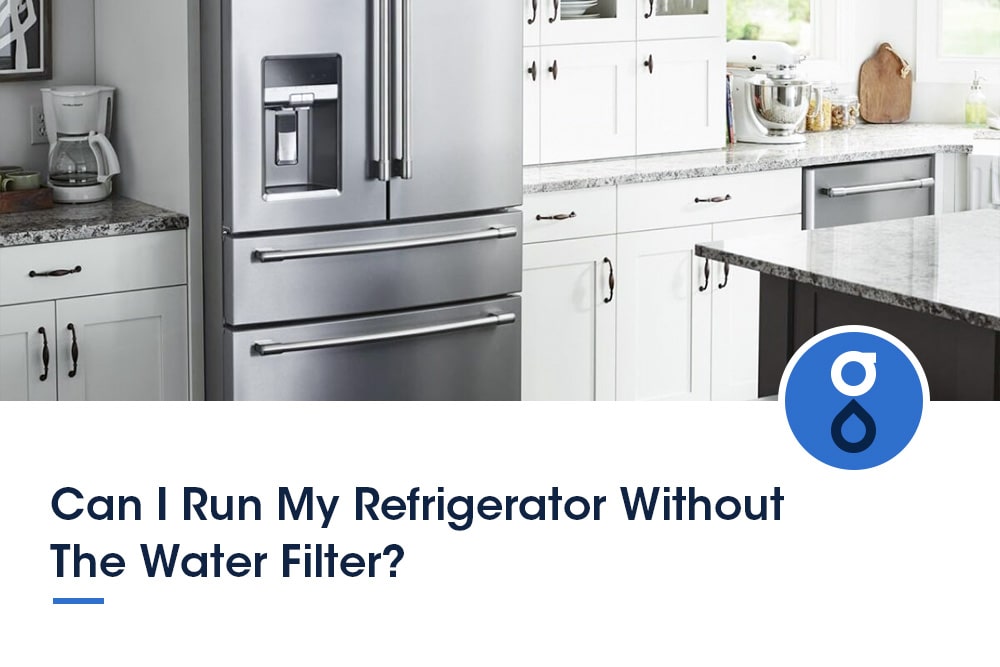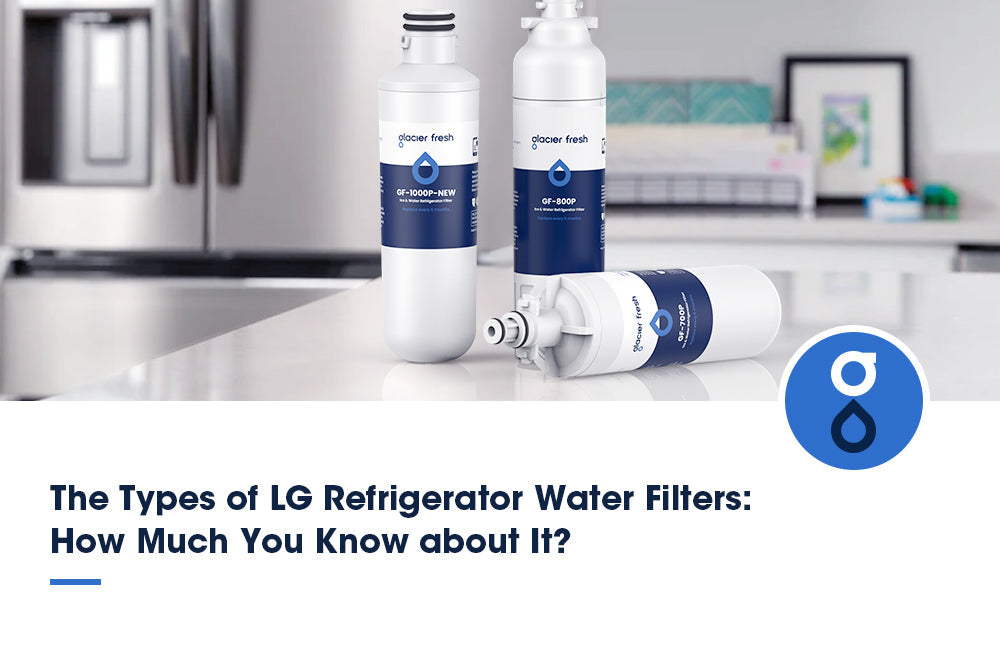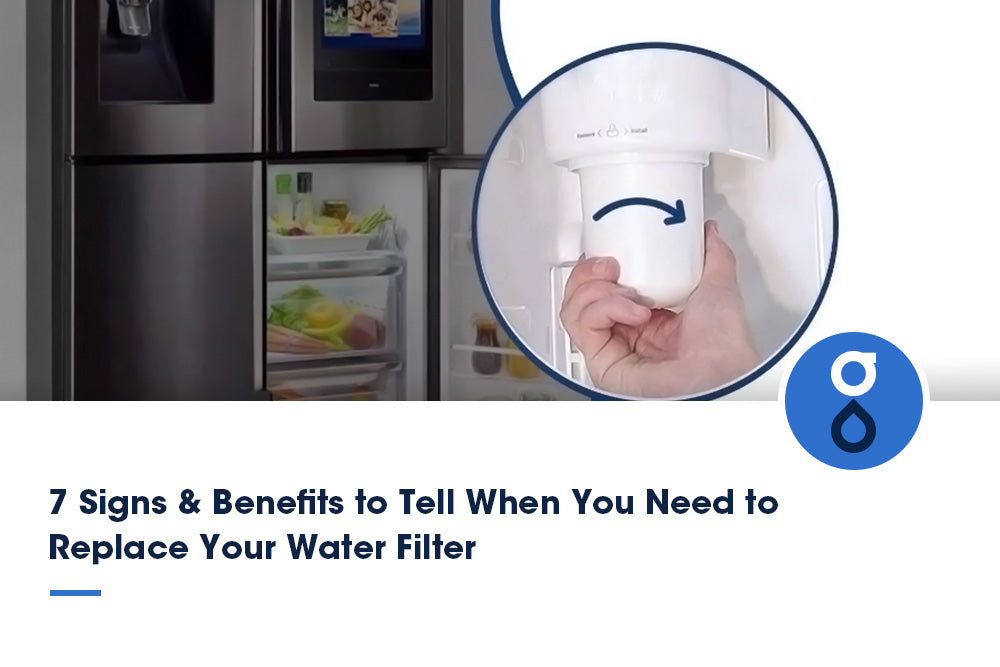Table of Contents:
Is Refrigerator Water Filter Necessary? Does It Work?
How To Know If My Fridge Has a Built-in Filter Bypass?
How Does A Refrigerator Work Without a Filter?
What is the Function of a Bypass Plug in a Refrigerator?
Can I Choose Not To Replace My Water Filter?
Is It Necessary To Change Your Refrigerator Water Filter?
Is It Expensive To Change Refrigerator Water Filters?
Will the Replacements be the Same Quality as OEM?
9 Signs You Need To Replace Your Fridge Water Filter
Summary
Are you fed up with changing refrigerator water filters, or cannot notice any improvement in your water quality? Whatever your reasons, it’s time to think again and take a wiser step.
Yes, many refrigerators are designed to run even if their water filter is not installed. However, running the system after removing the filter is not advised. Drinking unfiltered water can harm your health and make you sick. Moreover, allowing chemical-ridden water to flow through the bypass plug will damage the fridge interiors in the long run.
Is Refrigerator Water Filter Necessary? Does It Work?

Yes, refrigerator water filters are essential for every household to dispense clean water. These filters remove contaminants and ensure the safe quality of water.
Your water supply is always in danger of getting contaminated during pipeline transportation from water treatment plants to your tap. Tap water also contains residual chlorine and other substances harmful to human health. Therefore, it is necessary to install the refrigerator water filter.
Does a Refrigerator Run Without the Water Filter?
Different refrigerator models have different builds. So, whether or not they can function without a filter depends on the specifics mentioned in the user manual. In some refrigerators, you can remove the filter and bypass the pipeline connected to the dispenser. In others, there is a ‘bypass plug’ to switch on to use the fridge without the filter.
If neither a bypass plug nor a direct connection is possible, check if the filter housing can be closed with a filter cap. If yes, the filter is not needed. While in other cases, filter installation might be necessary for the fridge to function. Without the filter, your water and ice will be the same as tap water.

How To Know If My Fridge Has a Built-in Filter Bypass?
Only some refrigerators have an in-built filter bypass mode. To check if your fridge has this technology, read the user manual. If you have lost your manual, perform a simple test to know about the presence of the bypass system.
Locate the water filter housing in your refrigerator, grab and twist the cartridge counterclockwise, and pull it out of the assembly. Then, if you are still able to draw water from the dispenser, it means that your refrigerator has an automatic filter bypass mode.
You will be able to get water from the dispenser and ice from the ice maker, but their quality needs to be checked. However, if you cannot get water from the dispenser or ice from the ice maker after you remove the filter, you must consult a professional to install a suitable bypass plug or valve.
Which Refrigerator Brands Require a Bypass Plug to Work Properly?
Various reliable companies manufacture refrigerators that need a bypass plug to work without their filters. For example, the Kenmore refrigerator works well with a whole-house water filtration system if its corresponding bypass plug is attached. Moreover, this bypass plug fits appropriately with the older fridge models too. Likewise, the GE refrigerator is also a reputed brand that requires a bypass plug to function efficiently and correctly.
Here some models of Samsung refrigerator water filter that come with water filters. They have rotary valves to let the water flow even when the filter is removed or locked:
- RF4287HARS
- RS27t5200SR
- RS27t5200sg/AA
- RF28R7351SG/AA
- RF23J9011SG/AA
- RF28HFEDBSR/AA
- RF28JBEDBSG/AA
Why Do Some Refrigerators Not Work with Bypass Plugs?
Some refrigerator brands like to keep their components exclusive. As a result, they run with only OEM (factory original) and compatible parts. Thus, it is not often a good idea to install a filter bypass plug with a universal design.
How Does A Refrigerator Work Without a Filter?
The refrigerator with in-built water filters is generally supposed to work with the filters. Water filtration is necessary to eliminate common impurities present in the house water supply and provide clean water to the residents.
In another scenario, where you wish to remove the water filter from your fridge, you will need an extra part - a bypass plug. It helps water skip the filtration step and flow straight to the ice maker and water dispenser.
However, bypassing the water filter connection is not recommended, as it can lead to harmful consequences. Tap water containing contaminants will supply poor-quality ice or water with poor aesthetics like bad taste, smell, and odor. Moreover, heavy metals present in water have the potential to corrode internal refrigerator housing and possible breakdowns in the long run.
What is the Function of a Bypass Plug in a Refrigerator?
If you don’t need the built-in water filter of your refrigerator that filters out sediments and contaminants from the water supply, remove it and use the bypass plug instead. Remember that the water will not run when called for if a bypass plug is not present and the system is left filterless.
Can I Choose Not To Replace My Water Filter?
Many households have a POE (Point of Entry) filtration system like the whole-house or reverse osmosis unit installed at the main water distribution line. Thus, having an extra built-in filter in the refrigerator can be unnecessary and increase the operating and maintenance cost.
You can remove your old refrigerator filter and choose not to replace it. But, do know that the RO water treatment system has shortcomings as it removes healthy minerals such as calcium, magnesium, sodium, and potassium, along with harmful substances. In comparison, a refrigerator filter maintains these healthy minerals in drinking water.
Is It Necessary To Change Your Refrigerator Water Filter?
Practically, yes. Otherwise, it’s up to you. It is advised to use the refrigerator system as it is designed and avoid the bypass plug. Using the refrigerator as it was meant to be will be good for your health and help your refrigerator last longer.
Refrigerator water filters, mostly containing activated carbon, work on three simple principles:
- Adsorption
- Minute-level 0.5-micron pore size filtration
- Chemical reactions with contaminants present in water
The water quality reduces with time as this filter media saturates with captured impurities. Hence, no more surface area is available for more filtration. In the long term, this adsorbed and accumulated organic matter becomes a hotbed of bacterial growth. So, if you don’t want to drink contaminated water, make sure you replace the filter timely.
How Frequently Should I Change My Refrigerator Water Filter?
Different filters may have different lifespans, but generally, 6 months is advised as most filters. That’s because they suffer enough wear and tear from accumulated and passing impurities during this time. Sometimes, seasons may also play a role.
For example, when the water temperature is high in summer, replacing the water filter every three months is recommended due to high water demand. Your water filter has to work harder in summer than in other seasons and, thus, retires faster. Additionally, high temperatures in the summer months are ideal for the breeding of bacteria and other microbes.
How To Replace The Refrigerator Water Filter?
Follow these simple steps to replace your refrigerator water filter:
- First, locate the water filter in your refrigerator model. You can read the user manual, watch an online video, or search online to find it.
- Open the filter housing, and grab and twist the filter counterclockwise until you can pull it out. On some models, there’s a push button to release the filter.
- Install the new filter. Push it into place and turn it clockwise if you’re dealing with a button-release system.
- Close the housing lid until you hear a clicking sound, and you are good to go.
Is It Expensive To Change Refrigerator Water Filters?
No, it is cheaper than you think. Let's have a comparison.
The price of replacement filters varies depending on your refrigerator model. The price also varies for OEM and aftermarket filters. For example, some aftermarket filters cost around $15, which means purchasing a filter every 6 months would cost $30 per year.
As you can compare, this cost is even less than buying bottles of mineral water or changing the oil in your car. So, the annual cost of changing refrigerator water filters is very reasonable and important, as clean drinking water should be a priority for good health.
Will the Replacements be the Same Quality as OEM?
You don’t necessarily have to buy high-priced replacement filters from original company manufacturers. You have a choice. Tried and tested aftermarket filters work equally well and remove all harmful impurities. The only thing you have to check is the compatibility.
Aftermarket replacement water filters certified by NSF53 can remove more than 99% lead from your water supply. Glacier Fresh is certified to meet NSF 53 and 42 standards, just like the OEM options. Our filters also remove the same contaminants as factory originals, including chlorine, VOCs, asbestos, heavy metals, and turbidity.
9 Signs You Need To Replace Your Fridge Water Filter
Your fridge water filter will start giving indications of replacement as it approaches the end of its lifetime. So be vigilant and don’t ignore the following signs if you encounter them:
Smelly Water/Ice
You must already know that a dirty or contaminated tap doesn’t smell good. Moreover, when a filter is so concentrated with impurities that they flow into drinking water, you can smell the trouble. So, take it as a sign of bad filter health and do what needs to be done.
Unpleasant Taste
Well, contaminated water doesn’t taste good, either. The proliferation of microbes and accumulated water pollutants give a characteristic bitter taste that you can easily recognize in a sip. So stop drinking the water and check if the underlying cause is your worn-out filter.
Cloudy or Discolored Water
When your filter can no longer trap fine sediments, the water may look hazy, take on a yellowish or brownish tint, or contain visible particles.
Slow Water Dispensing
Saturated filter media means less space available for water to pass through. So if If filling a glass takes noticeably longer than before, mineral deposits or debris may be clogging the filter, restricting flow. Then, you can take it as a sign to replace your old filter with a new one.
Decline in Ice Production
The same applies to your ice maker. An ice maker also gets water from a refrigerator water filter. A clogged filter restricts flow to the ice maker, leading to fewer cubes or ice that is smaller than normal. So, check if the water filter needs replacement.
Indicator Light is On
Modern refrigerators come with an indicator light feature to notify the users when the filter needs to be changed. This indicator system detects the condition of the filter media and turns from green to yellow and then red when it`s time to change the filter.. Although this system is reliable, don’t hesitate to inspect the filter before indication, just to be sure.
Water Leaks or Puddles Near Filter Housing
A worn-out O-ring or cracked filter casing can lead to slow drips or pooling underneath the fridge — another cue to swap the cartridge.
Corrosion or Damage to Filter Head
Rust or physical cracks around the filter mount can compromise water flow and seal integrity, necessitating a new filter and possibly housing maintenance.
More than 6 Months of Use
As mentioned earlier, 6 months is enough time to wear out many refrigerator filters. Additionally, go through the filter’s manual to cross-check the lifespan and make the replacements accordingly.

Summary
We hope this article has made your decision-making process easier. I have tried to answer every question about refrigerator water filters and whether you can run your fridge without them. So, you now know that running the fridge filterless is not recommended, but it might be justified under certain circumstances.
Anyways, if you need a high-quality certified replacement filter at a low cost, check out Glacier Fresh filters. Glacier Fresh manufacture different types of refrigerator filters that are compatible with various refrigerator models. You can easily find your right match in no time.


















